Finance
19 Percent of Consumers Find Car Buying Process Transparent
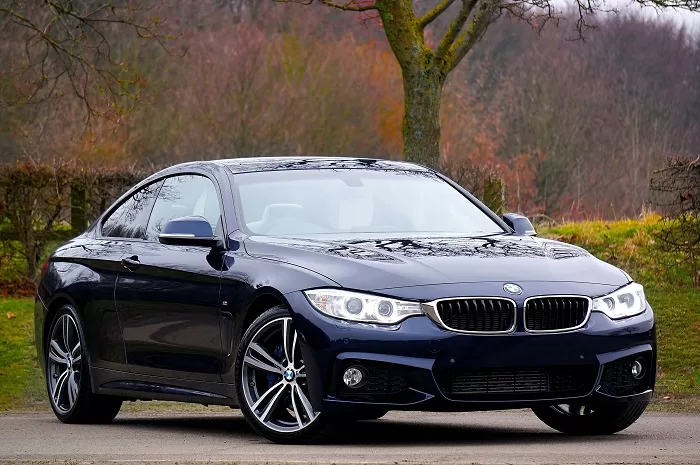
After two years of economic upheaval, beginning with the COVID-19 pandemic in 2020 and then the vehicle inventory shortage of 2021, the automotive industry continues to experience troubles with inflation, rising interest rates, and gas prices hitting all-time highs in the United States. These events have impacted car buyers’ and dealers’ perceptions of the car buying process in different ways. Dealers have a big opportunity to infuse transparency into their car buying practices, particularly as both agree that EVs are the future.
The 2022 Car Buying Outlook: A Deeper Dive captures car buyers’ and dealers’ perceptions on three areas of car buying: transparency, approaches to digital car buying, and electric vehicles.
Key Findings:
- The gap in perception of transparency in the car buying process between car buyers and dealers continues to widen. Since the 2021 Car Buying Outlook, there has been a decrease in perception of transparency in the car buying process among car buyers (40% v 19%). However, perceptions of transparency increased among car dealers (54% v 78%).
- A majority of car buyers (72%) say that the chip/part shortage has affected their car buying plans. Less than half (39%) say they are willing to order and wait for the delivery of their next car.
- While car buyers begin their car buying process online, they find value in the in-person experience. Negotiations are an important part of the car buying process and 61% say these need to happen in person. 37% say that being able to negotiate the price influences the final price of a car the most, and a majority of car buyers say that negotiation is a necessary part of car buying (87%). Additionally, 88% say test driving the car is an important part of the car buying process.
- When thinking about what type of vehicle car buyers would consider purchasing, only 35% say they would consider purchasing an electric vehicle as their next car. Despite this, car buyers largely agree electric vehicles are the future (61%). 46% of car buyers say they’ll be driving an electric vehicle in 10 years. Cost of electric vehicles (59%) is the largest concern among car buyers, who say the vehicles are “too expensive to buy.” Nearly half of car buyers (46%) strongly or somewhat agree that the recent increase in gas prices has increased the likelihood of them buying an electric vehicle.
- Dealers agree that electric vehicles are the future (84%). Dealers are prepared for an increase in future demand (86%) for these types of vehicles.
“Early in the pandemic, dealers had to rapidly adopt digital tools to meet consumers where they were in the changing environment. However, we knew the intangibles of car buying, such as the test drive, would always drive car buyers back to the dealership,” said Sanjiv Yajnik, President of Financial Services at Capital One. “To win with consumers now and in the future, dealers must optimize the digital and in-person experiences to provide their customers with the seamless, transparent car buying process they desire.”
Transparency
Perceptions of transparency in the car buying process continue to shift downward for car buyers but remain high and stable for car dealers. 78% of dealers report that the car buying process is “completely” or “very” transparent, while only 19% of car buyers say the same. Buyer perception in transparency sees a 21-point decrease since the release of the 2021 Car Buying Outlook (40% v 19%).
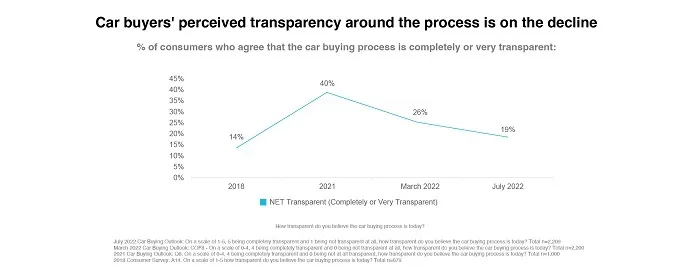
Car buyers are more skeptical with approximately a quarter saying there is transparency around whether they’re getting a fair deal (24%) or the impact of add-ons to monthly payments (26%). On the other hand, at least 8-in-10 dealers believe that all individual aspects of purchasing a car are transparent. Additionally, a majority of dealers say that there is transparency surrounding pricing, including fairness of the deal (80%), the actual price of add-ons and how it impacts monthly payments (tire protection, extended warranties, service contract, etc)(82%), and final sales price of the car (79%).
Over three-quarters (77%) of car buyers say that dealerships should provide more information upfront about pricing and financing so that the consumer is better informed. A plurality of car buyers says getting the best deal (38%) is the most important aspect of purchasing a car and almost 4-in-10 say that being able to negotiate the price is what most influences the final price of the car.
Approaches to Digital Car Buying
Nearly all car buyers (82%) want a hybrid (mix of online and in-person elements) or in-person car buying experience – while research is done more easily online, seeing and test driving the car is an important part of the experience. Despite an increase in digital tools throughout the pandemic, few car buyers (3%) want to handle the entire car buying process online. Before getting to the dealership, approximately 4-in-10 recent car buyers want to research information on the vehicles (44%), make sure the price is fair (41%) and select their preferred make and model (40%).
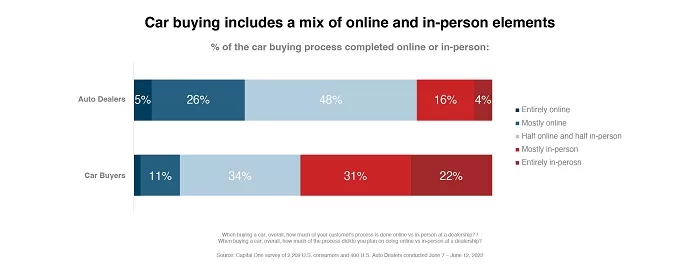
While a plurality of car buyers find that it is easier to compare prices online (41%), it does not replace the in-person experience of seeing and test driving the car before purchasing (47%). Car dealers are aware that more customers are utilizing digital tools before coming to the dealership (81%), particularly to research information on vehicles (53%). However, there is a gap in perception of how much of the process is being done online – dealers are more likely to say their customers are doing the car buying process either “entirely” or “mostly” online (30%) than car buyers (14%). This is most apparent at the end of the car buying process; car dealers believe at a higher rate than buyers that trade-ins (41%) or structuring the deal (40%) are done at least mostly online (v 17% for buyers).
Electric Vehicles
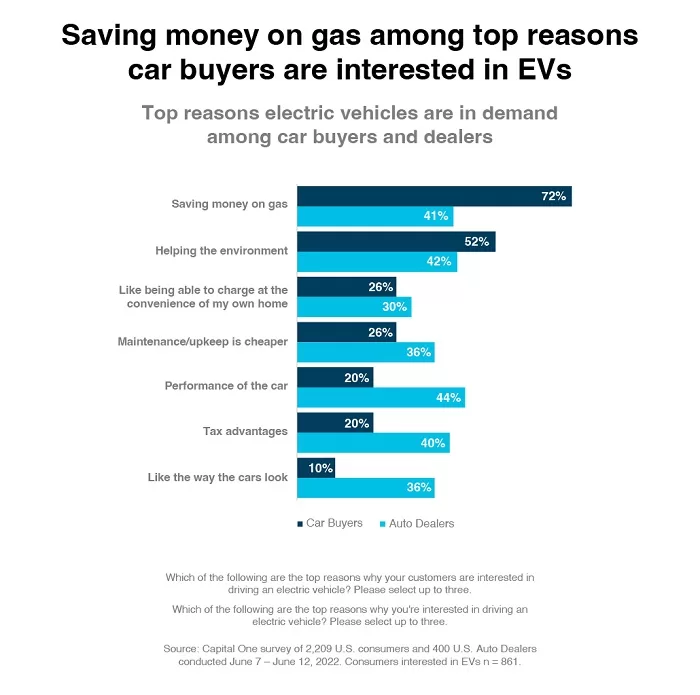
Car dealers are largely familiar with and are comfortable selling electric vehicles, but purchasing consideration among car buyers (35%) is low for these types of vehicles. Nearly all dealers say they sell (99%) and service (96%) electric vehicles, hybrid vehicles or both. Although most dealers are familiar with (94%) and are comfortable selling and talking about electric vehicles with customers (94%), most agree that uncertainty around federal and state regulations (75%) and infrastructure (77%) make it difficult for them to stay educated on electric vehicles.
Despite overwhelming familiarity among dealers, just over half of car buyers (56%) say they are familiar with electric vehicles, with only 10% saying they are “very” familiar. Affordability concerns and a lack of strong familiarity with electric vehicles may translate to low purchasing consideration (35%) among consumers. Notwithstanding relatively low purchasing consideration for electric vehicles, a majority of car buyers somewhat or strongly agree that electric vehicles are the future (61%).
Reflecting all-time high gasoline prices, car buyers who are interested in driving an electric vehicle overwhelmingly cite saving money on gas (72%) as a top reason, and nearly half of car buyers (46%) somewhat or strongly agree that the recent increase in gas prices has increased their chances of purchasing an electric vehicle as their next car. However, among car buyers who are not interested in buying an EV, cost (59%) is seen as a major hurdle in purchasing an electric vehicle. Nearly 7-in-10 agree that electric vehicles are more expensive to purchase than traditional cars.
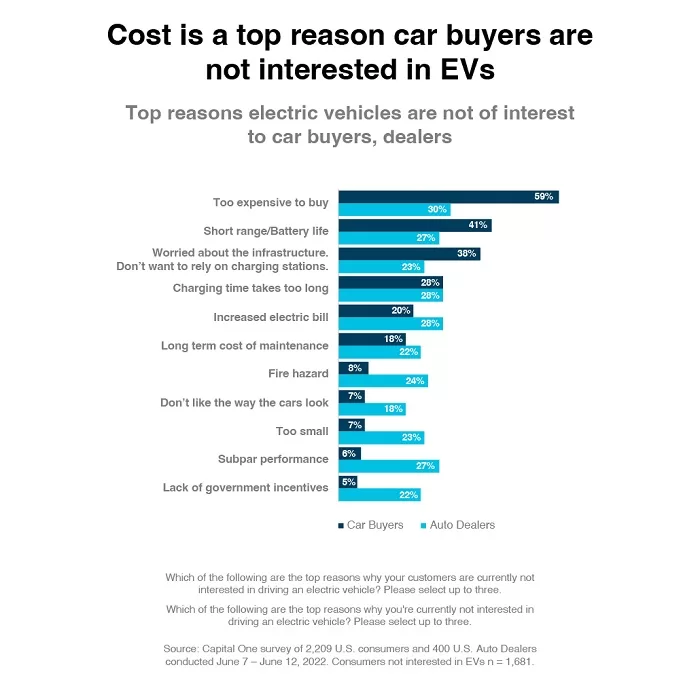
Car dealers are also betting on electric vehicles, with over 8-in-10 saying that electric vehicles are the future (84%) and are prepared for an increase in demand for electric vehicles (86%).
Methodology
The Capital One Car Buying Outlook consists of findings from two surveys targeted to car buyers and dealers.
The consumer survey of 2,209 U.S. adults ages 18+ was conducted on behalf of Capital One Auto Finance using Morning Consult. Of the 2,209, 374 have purchased a car in the last six months and are considered “current buyers”, and 1,835 self-reported that they’re planning to purchase a car within the next two years and are considered “future buyers”. The survey was fielded June 08-12, 2022 with a margin of error of +/- 2%.
The dealer survey of 400 current car dealers was conducted on behalf of Capital One Auto Finance through Morning Consult. The 400 respondents work for an automobile dealership as an owner, general manager, F&I director, sales manager, internet manager or in the business development center at dealerships with an approximate annual sales volume of at least $1M. The survey was fielded June 07-09, 2022 with the margin of error +/- 5%.
Within year findings are compared to the 2022 Car Buying Outlook Volume One. The 2022 Car Buying Outlook Volume One was fielded to 2,200 U.S. adults ages 18+ and 530 current car dealers between October 20-29, 2021.
Year-over-year findings are compared to:
The 2021 Car Buying Outlook. The 2021 Car Buying Outlook was fielded to 1,000 U.S. adults ages 18+ and 401 current car dealers between October 1-20, 2020.
The 2020 Consumer Survey. The 2020 Consumer survey was fielded to 1,000 U.S. adults ages 18+ was conducted on behalf of Capital One Auto Finance using Ipsos. *Of the 1,000, 348 have bought/leased a car in the last 6 months and 652 self-reported that they’re planning to buy/lease a car within the next two years. The survey was fielded October 1-14, 2020 with a margin of error of +/- 3.1%.
The 2018 Consumer Survey. The 2018 Consumer study was fielded to 1,002 U.S. adults ages 18+ was conducted on behalf of Capital One Auto Finance using Engine Insight’s Online CARAVAN ® omnibus. *Of the 1,002, 693 do not work at a car dealership or ad/public relations company, have purchased a vehicle in the past, are planning to get an auto loan or ever had one. The survey was fielded October 15-17, 2018.
Within the survey, electric vehicles were defined as having a battery instead of a gasoline tank, and an electric motor instead of an internal combustion engine.
Source: Capital One





















































